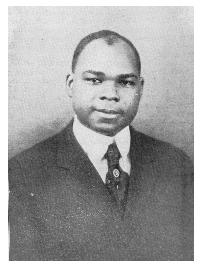

One of these is Jonathan Sebastian Butts, of Beckley, the county seat of Raleigh County.
Mr. Butts was born and reared at Jarratt in Sussex County, Va., which is near the southern border of the State. The date of his birth was June 4, 1880; and his parents were Benjamin Butts, a farmer, and Louisa (Lundy) Butts. His paternal grandparents were Nathan and Cherry Butts, the maternal grandparents, Ical and Susan Dundy, and were all slaves before Emancipation.
Young Butts grew up on the Sussex County farm, and there pursued his elementary studies in the public school, working on the farm between terms. Awakened to the necessity of securing an education if he would make life count, he entered Howard University at Washington D. C., for his preparatory and college courses. He was graduated from Howard with the A.B. degree in 1910. The following fall he matriculated at the Detroit College of Law, where he won his B.L. degree in 1913. His way in college was not easy as, from the very beginning, he was under the necessity of making his own way. This he did by work on the farm, and in the pullman service. He found the travel and contacts of the pullman work a liberalizing and helpful influence, apart from the money it enabled him to earn. After his graduation he was admitted to the Michigan Bar, and later in West Virginia. For five years he taught in the rural schools of West Virginia, but now devotes his whole time to his profession. His practice is almost entirely civil.
In religion Mr. Butts is a Baptist, in politics a Republican, and has done some campaigning for the party. He holds membership in the Elks and the Masons. He is also a member of the State Colored Bar Association, and the Raleigh County Bar Association. After the literature of his profession, his favorite reading is history, both sacred and profane.
His work both as a teacher and as a lawyer has given him the opportunity to study conditions and he believes that the progress of the race is to be promoted "By improved facilities for education, the expansion of the economic and commercial life of the race, equality of opportunity, when prepared by training, experience and ability."